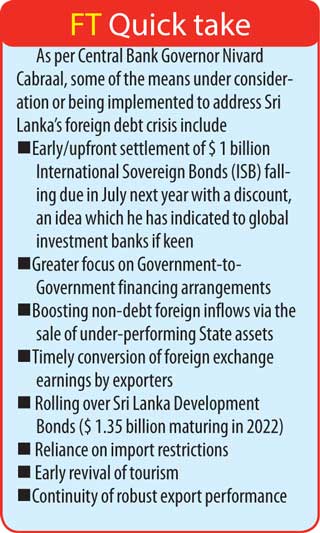Monday Feb 16, 2026
Monday Feb 16, 2026
Monday, 27 September 2021 00:00 - - {{hitsCtrl.values.hits}}
By Nisthar Cassim
|
CBSL Governor Ajith Nivard Cabraal
|
Central Bank new Governor Nivard Cabraal on Saturday ruled out Sri Lanka going to the International Monetary Fund (IMF) to seek financial support to manage the debt servicing challenge saying the Government will rely on “homegrown workable solution”.
His assertion was despite growing calls from several economists and the Opposition for the Government including former Prime Minister Ranil Wickremesinghe at the webinar, to go for an IMF bailout as well as debt restructuring initiative, given the high over $ 5 billion in foreign debt repayment next year and a further liability of $ 25 billion between 2023 and 2027.
“I am ruling out going to the IMF or a debt restructuring but we will rely on homegrown and workable solutions,” Cabraal told a webinar titled ‘Debt sustainability – Current challenges’ organised by the Daily FT in partnership with the International Chamber of Commerce, Sri Lanka and several other organisations.
Cabraal said initial components of the “homegrown” solutions will be made public when the short-term Road Map is unveiled on 1 October. “Our road map will instil stability and growth,” he added.
“There is no need for a debt restructuring or to go for an IMF program. We will honour all our debt commitments whilst addressing the vulnerabilities,” emphasised Cabraal, who had previously served as the Central Bank Governor for nearly nine years between July 2006 and January 2015.
Cabraal indicated homegrown solutions include an early/upfront settlement of $ 1 billion International Sovereign Bonds (ISB) falling due in July next year with a discount, an idea which he has indicated to global investment banks if keen.
Other measures include greater focus on government-to-government financing arrangements, boosting non-debt foreign inflows via the sale of under-performing State assets, timely conversion of foreign exchange earnings by exporters, rolling over Sri Lanka Development Bonds ($ 1.35 billion maturing in 2022), reliance on import restrictions and an early revival of tourism along with continuity of robust export performance.
Ruling out a debt restructuring with IMF technical support Cabraal also said that the Central Bank has enough expertise within and at present each foreign debt liability is under study with exploration of different strategies to deal with those.
“Yes we have some tension in our external account at present but we are taking stern and careful decisions. It is not a case of Sri Lanka has been pushed to the wall with no options,” emphasised Cabraal who also added 8% growth in the first half of this year though from a low base reaffirms that Sri Lanka is not in recession.
He also said that the short-term goal is to reduce the outstanding ISBs (estimated at $ 13 billion at present) to $ 11-11.5 billion by end next year and to be comfortable with ISBs being around 10% of the foreign debt portfolio. Cabraal recalled that the previous Yahapalana regime during its office boosted borrowings via ISBs by $ 10 billion and the new Government was in fact forced to deal with its repercussions.
World Bank former Chief Economist and Georgetown University USA current Professor of the Practice of Development Prof. Shanta Devarajan, speaking from the US, was among several experts at the webinar who emphasised the need for Sri Lanka to go with its own debt restructuring program to the IMF.
He said such an exercise “from a position of strength than weakness” following a debt sustainability analysis will garner support from other multilateral donors in the likes of the World Bank and the Asian Development Bank apart from international capital markets.
Institute of Policy Studies Executive Director Dr. Dushni Weerakoon said absence of a credible and publicised plan on the part of the Government on how it plans to deal with the mounting foreign debt repayment has led to concerns and uncertainty in markets. In that context, she looks forward to the short-term road map on 1 October as indicated by Governor Cabraal.
University of Rotterdam Netherlands Senior Lecturer in Economics and ISS Associate Professor Dr. Howard Nicholas was of the view that the Government’s interest payments on debt have reached an alarming level of nearly 90% of revenue hence the situation remains serious. He emphasised the more pragmatic way to deal with debt sustainability and repayment was a concerted effort to boost high value-added exports. This suggestion was widely endorsed by other experts in the webinar as well.
The issue of high fiscal deficit and its correlation to overall public debt, the need for a realistic exchange rate, and public sector reforms were also highlighted at the webinar, which also had, as experts, Reserve Bank of India former Governor Dr. Duvvuri Subbarao, RBI former Deputy Governor Dr. R. Subramaniam Gandhi, CBSL former Senior Deputy Governor Dr. Nandalal Weerasinghe, United Nations Economics and Social Commission for Asia and the Pacific Acting Section Chief – Financing for Development Dr. Alberto Isgut, National University of Singapore Non-Resident Senior Fellow and a former Director of Research of the ADB Institute in Japan Dr. Ganeshan Wignaraja, and Lanka Rating Agency CEO Adrian Perera.
The MBA Alumni Association of University of Colombo, CA Sri Lanka and Ceylon Innovent were supporting organisations of the webinar which was aired on multiple web and social media platforms.
